April 25, 2024 | 07:04 GMT +7
April 25, 2024 | 07:04 GMT +7
Hotline: 0913.378.918
April 25, 2024 | 07:04 GMT +7
Hotline: 0913.378.918
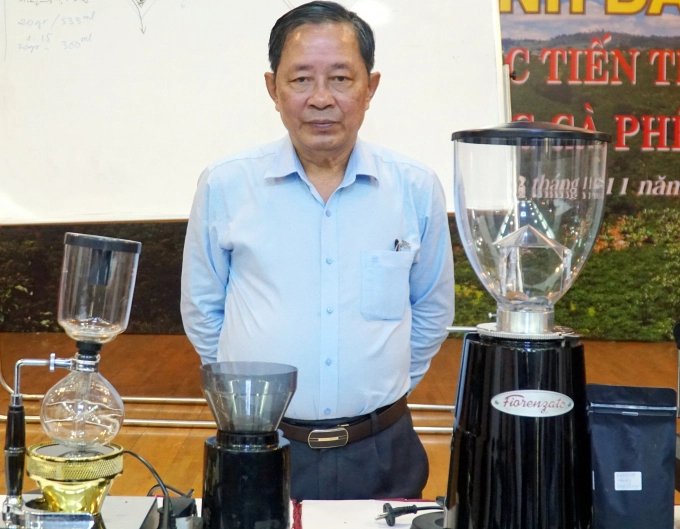
Nguyen Nam Hai, deputy chairman of Vietnam Coffee and Cocoa Association (VICOFA) shares information of the domestic and global coffee consumption. Photo: Nguyen Thuy.
The Vietnam Coffee and Cocoa Association (VICOFA) and the HCM City Trade Promotion Department kicked off a training course for coffee producers and businesses in the city on November 12.
The two-day course was aimed to provide leaders of the association and coffee businesses in the south knowledge to "Enhance the capacity of trade promotion and market development for coffee businesses" and "Enhance the capacity to prepare and taste coffee," said VICOFA’s representative.
Nguyen Nam Hai, VICOFA’s deputy chairman said: “Vietnam is the world's second largest coffee producer and exporter after Brazil. Regarding Robusta coffee, Vietnam is the largest producer and exporter in the world. Every year, Vietnam exports about 1.6 to 1.8 million tonnes of coffee with a turnover of about US$ 2.6 - 3.3 billion.”
Hai said the demand for coffee has been on an increasing trend globally in recent years, mentioning the statistics of the International Coffee Organization (ICO) data that each day the world consumed about 2.25 billion cups of coffee.
He added: “The annual demand for coffee worldwide is estimated to increase by an average of 2-3 per cent. Currently, the average domestic consumption of coffee growing countries is 9-12 kg per person per year. Brazil, Indonesia consumes about 30 per cent of their coffee output per year.”
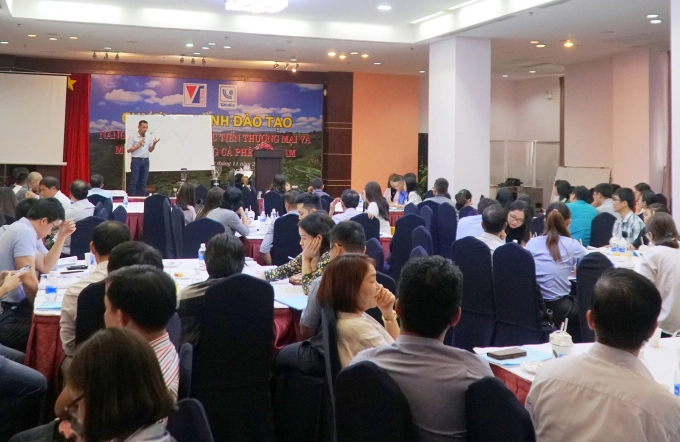
The overview of training course in HCM City. Photo: Nguyen Thuy.
In Vietnam, Hai said: “The domestic consumption accounts only 6-7 per cent of the total production with the average of 0.5kg per capita per year five years ago. But it is increasing now.”
According to the association, thanks to more investment and promotion, local consumption demand for coffee has increased from 7per cent to 13 per cent. Now, with the output of 200,000 tonnes per year, the local consumption per capita has reached around 2kg per person per year.
Hai said from very few brands of domestic enterprises such as Vinacafe Bien Hoa, Trung Nguyen, Phuong Vy in the past, there were now a lot of Vietnamese enterprises, which have been known to domestic and foreign consumers. They inluded LeMant products of Vinh Hiep Company, K+ of Phuc Sinh Company, as well as coffee products of Intimex and Tin Nghia companies.
The deputy added: " Intimex and Tin Nghia have invested over US$30 million in the instant coffee roasting system to create unique brands and products."
Luong Van Tu, the association chairman quoted current statistics, saying: “Vietnam has more than 500,000 cafes of different types in big cities like HCM City, Hanoi and Da Nang.
Tu mentioned good sides of the product to the health such as enhancing the longevity; reducing the rate of vascular disease, heart failure, the risk of stroke, the risk of some cancers, liver-related diseases; preventing hyperglycemia, blood fat reduce; reduction of; helps the brain awake; boosting mental health and fighting depression.
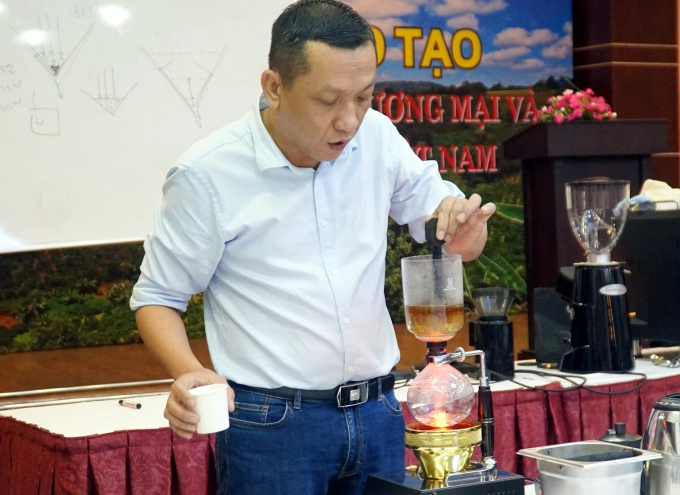
Nguyen Tan Vinh, coffee expert instructs how to prepare coffee. Photo: Nguyen Thuy.
In order to support coffee businesses, increase domestic consumption, and limit the negative impact of the global coffee price crisis, the course has also provided reports re-evaluating the coffee consumption of Asian countries and and Vietnam in recent years so that enterprises can take advantage of rules of origin and other things in their export.
At the same time, it also gave training on quality coffee roasting techniques that help encourage consumers to use the local high quality coffee.
Author: Nguyen Thuy. Translated by Do Do. Edited by Duc Huy.
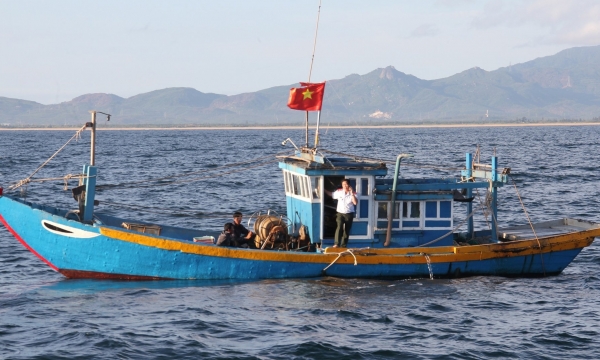
(VAN) Combating IUU fishing is a worldwide problem. As a result, governments must strengthen their collaboration in order to take effective action and guarantee the sustainability of seafood resources.
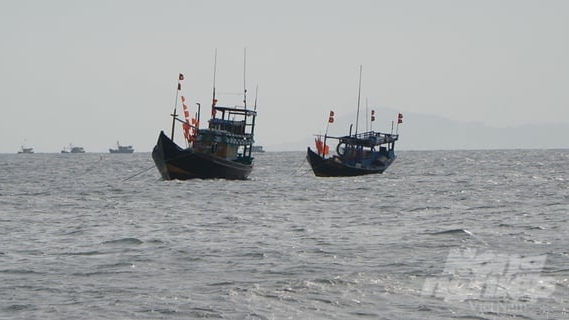
(VAN) Strict management of '3 no' fishing vessels in Ba Ria - Vung Tau helps the province effectively implement the EC's anti-IUU fishing recommendations and control the fishing fleet.
/2024/04/22/3159-9-202859_158.jpg)
(VAN) There are three main solution pillars for developing the crop production industry, including resources, infrastructure, and science and technology.
/2024/04/22/4244-anh-3-193503_494.jpg)
(VAN) The national crop production strategy is a good opportunity to create diversity, bring income to farmers, increase economic value, and contribute to socio-economic development.
/2024/04/22/1205-1-190414_594.jpg)
(VAN) The Prime Minister issued Decision No. 1784 dated December 30, 2023, approving the plan to develop the crop production industry until 2030, with a vision to 2050.
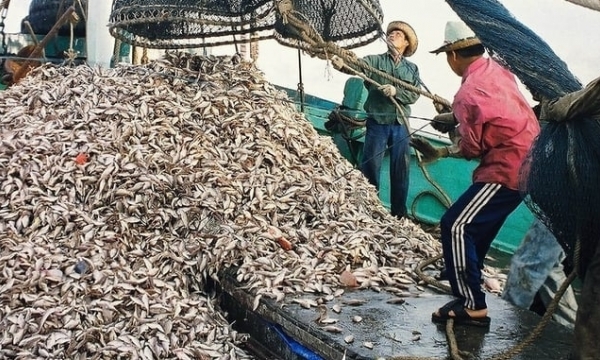
(VAN) The goal of the action plan is to identify anti-IUU fishing as an urgent, crucial and long-term task for the sustainable development of the fisheries sector.
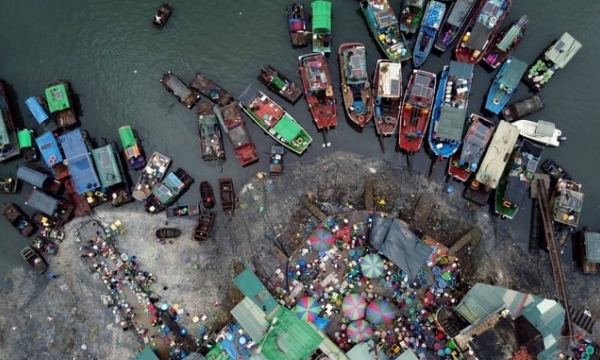
(VAN) Despite numerous challenges, Permanent Member of the Secretariat Truong Thi Mai emphasized the need for decisive action to achieve tangible results in anti-IUU fishing efforts.